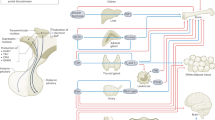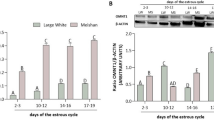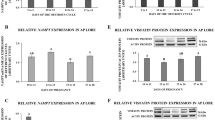Abstract
THE pituitary gland produces a family of related peptide hormones (Fig. 1). Adrenocorticotrophic hormone (ACTH), β-lipotropic hormone (β-LPH) and possibly γ-lipotropic hormone (γ-LPH) are produced by the pars distalis. α-Melanocyte stimulating hormone (α-MSH), β-melanocyte stimulating hormone (β-MSH) and corticotropin-like intermediate lobe peptide (CLIP)1, however, are thought to be formed in the pars intermedia2, their being found only in those species in which this structure can be distinguished. They have not been identified in man3. The human foetus, however, does develop a rudimentary pars intermedia which involutes shortly after birth4. We present, for the first time, evidence for the occurrence of peptides resembling α-MSH and CLIP in the human foetal pituitary in the second half of pregnancy, and we suggest that these peptides are the dominant hormones of foetal life, only replaced by ACTH before parturition.
This is a preview of subscription content, access via your institution
Access options
Subscribe to this journal
Receive 51 print issues and online access
$199.00 per year
only $3.90 per issue
Buy this article
- Purchase on Springer Link
- Instant access to full article PDF
Prices may be subject to local taxes which are calculated during checkout
Similar content being viewed by others
References
Scott, A. P., Lowry, P. J., Bennett, H. P. J., McMartin, C., and Ratcliflfe, J. G., J. Endocr., 61, 369–380 (1974).
Lowry, P. J., and Scott, A. P., Gen. comp. Endocr., 26, 16–23 (1975).
Scott, A. P., and Lowry, P. J., Biochem. J., 139, 593–602 (1974).
Wingstrand, K. G., in The Pituitary Gland, 3 (edit. by Harris, G. W. and Donovan, B. T.), 1–23 (Butterworths, London, 1966).
Gilkes, J. J. H., et al., J. clin. Endocr. Metab., 40, 450–457 (1975).
Ratcliffe, J. G., Knight, R. A., Besser, G. M., Landon, J., and Stansfeld, A. G., Clin. Endocr., 1, 27–44 (1972).
Orth, D. N., in Methods of Hormone Radio-Immunoassay (edit. by Jaffe, B. M., and Behrman, H. R.), 125 (Academic, New York and London, 1974).
Shizume, K., Lerner, A. B., and Fitzpatrick, T. B., Endocrinology, 54, 553–560 (1954).
Lanman, J. T., Pediatrics, 27, 140–158 (1961).
Eberlein, W. R., in The Human Adrenal Cortex (edit. by Christy, N. P.), 317–327 (Harper and Row, New York, 1971).
Honnebier, W. J., Jobis, A. C., and Swaab, D. F., J. Obstet. Gynaec. Br. Commonw., 81, 423–438 (1974).
Liggins, G. C., Fairclough, R. J., Grieves, S. A., Kendall, J. Z., and Knox, B. S., Rec. Progr. Hormone Res., 29, 111–159 (1973).
Murphy, B. E. P., Am. J. Obstet. Gynec., 115, 521–525 (1973).
Fencl, M. de M., and Tulchinsky, D., New Engl. J. Med., 292, 133–136 (1975).
Author information
Authors and Affiliations
Rights and permissions
About this article
Cite this article
SILMAN, R., CHARD, T., LOWRY, P. et al. Human foetal pituitary peptides and parturition. Nature 260, 716–718 (1976). https://doi.org/10.1038/260716a0
Received:
Accepted:
Issue Date:
DOI: https://doi.org/10.1038/260716a0
This article is cited by
-
Des-acetyl-α-MSH and not α-MSH is the major form of α-MSH in amniotic fluid
Journal of Endocrinological Investigation (1988)
Comments
By submitting a comment you agree to abide by our Terms and Community Guidelines. If you find something abusive or that does not comply with our terms or guidelines please flag it as inappropriate.



